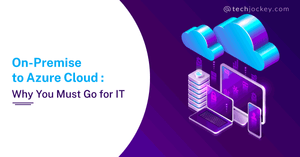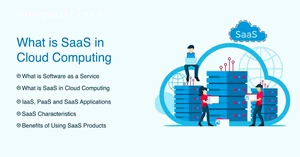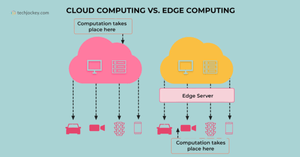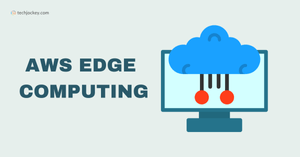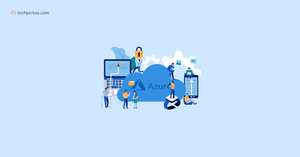What are Cloud Computing Platforms?
A cloud computing platform is essentially the hardware and operating system of a server housed in an Internet-based data center. This platform allows for the distant and widespread coexistence of hardware and software resources. It serves as the foundation for delivering various services over the Internet, including data storage, servers, databases, networking, and a wide array of software tools and applications. With cloud storage, files are securely stored on a distant database instead of relying on local hard drives or storage devices.
What's truly convenient is that an electronic device may obtain the software programs and stored data it needs to operate seamlessly as long as it is connected to the internet. Given its multitude of benefits, such as cost savings, heightened productivity, faster and more efficient operations, and improved performance and security, individuals and businesses are increasingly turning to cloud computing platforms.
Why Use Cloud Computing Platforms?
Organizations of all sizes, from start-ups to multinational firms, governmental organizations, and non-profits, are turning to cloud computing platforms for a variety of compelling reasons. Here are the key motivations for using cloud computing platforms;
- Create Cloud-Native Applications: Cloud platforms enable the rapid development, deployment, and scaling of web, mobile, and API applications. They use DevOps techniques, microservices architecture, containers, Kubernetes, and API-driven communication, among other cloud-native technologies.
- Store, Back Up, and Recover Data: Cloud storage systems provide a cost-effective and scalable solution for data protection. Data may be safely moved from any location to remote cloud storage via the internet and accessed on any device.
- Stream Audio and Video: Cloud services support high-definition audio and video streaming to connect with audiences worldwide, regardless of location or device.
- Deliver Software on Demand (SaaS): SaaS solutions allow businesses to provide clients with the most recent software versions and upgrades whenever and wherever they want.
- Test and Build Applications: Cloud infrastructures offer flexibility and scalability for application development, reducing time and cost.
- Analyze Data: Cloud platforms facilitate data unification across teams, departments, and locations. They also provide access to machine learning and artificial intelligence services for data-driven insights.
- Embed Intelligence: Intelligent models available in the cloud assist in customer engagement and extract valuable insights from captured data.
Common Types of Cloud Computing Platforms
Cloud computing platforms come in various forms to suit diverse needs, and they can be categorized into three common types;
- Public Cloud: Public cloud computing platforms are provided by third-party companies over the Internet. Through the use of these platforms, an organization may extend its IT infrastructure by hosting specific services and components on virtual servers that are owned and operated by a third party, creating a virtualized environment. Service providers like Amazon Web Services (AWS), Alibaba, Microsoft Azure, Google Cloud Platform, and IBM Bluemix offer a wide range of capabilities and services, each with its own pricing strategies.
- Private Cloud: Dedicated to a single company, private cloud computing platforms are often hosted by third-party service providers or on-site data centers. Private clouds operate in a single-tenant environment, meaning that resources are not shared with other users. They can be hosted on existing in-house data center infrastructure or on separate infrastructure provided by a third-party provider.
- Hybrid Cloud: Hybrid cloud computing platforms combine elements of both public and private clouds, enabling the smooth transfer of data and applications between the two. This adaptability is a huge benefit, particularly for companies that need to adapt and change rapidly. To gain a competitive edge, companies may form a hybrid cloud setup in accordance with their specific needs by integrating public and private clouds along with on-premises resources.
Key Features of Cloud Computing Platforms
Cloud computing platforms offer a range of distinctive features, such as;
- Self-service On-Demand: Clients have the ability to control computing resources, network storage, and server uptime as needed, making cloud computing highly flexible and client-centered.
- Resources Pooling: Cloud service providers can allocate resources to multiple clients by offering customized services without conflicting with individual data needs. It's a multi-client resource management strategy for data storage, bandwidth, and data processing.
- Easy Maintenance: Cloud servers require minimal maintenance with low downtime. Frequent updates enhance performance and efficiency, ensuring optimal service.
- Economical: Cloud computing is cost-effective, reducing IT and data storage expenses. Many cloud services offer free options, with paid plans primarily aimed at expanding storage capacity.
- Rapid Elasticity and Scalability: Cloud platforms effortlessly handle varying workloads and data loads. The requirement for technical staffing and manual labor is decreased by automation.
- Efficient Reporting Services: Cloud services provide swift reporting in case of errors or issues, with a responsive back-end team to address user reports promptly.
- Automation: Cloud services can streamline operations and reduce manual intervention in data management by automatically configuring, installing, and rebooting resources.
- Security: Cloud computing offers robust security, protecting data from threats such as piracy, data breaches, and malware, even in the event of device infection.
- Huge Network Access: Any device with an internet connection may access cloud services. Service providers can efficiently manage data due to their extensive network access.
- Resilience: Cloud services recover swiftly from disruptions, with no geographical barriers to accessibility. Clients can access cloud resources remotely and ensure continuity and widespread availability.
Benefits of Using Cloud Computing Platforms
Cloud computing offers several significant benefits for organizations;
- Cost Optimization: Moving to the cloud allows businesses to reduce IT costs by eliminating the need to invest in hardware, software, and onsite data centers. This cost-saving approach means no more expenses for servers, power, cooling, or IT experts for infrastructure management.
- Speed and Flexibility: Cloud computing services are self-service and on-demand which provides for rapid provisioning of computing resources with just a few clicks. This flexibility eases the burden of capacity planning and provides businesses with the agility to adapt to changing needs quickly.
- Global Scalability: Cloud services allow organizations to scale resources elastically, providing the right amount of computing power, storage, and bandwidth precisely when and where they are needed, on a global scale.
- Enhanced Productivity: Time-consuming IT tasks like software patching and device setup are reduced with cloud computing. IT teams may now concentrate on important business strategies and objectives instead.
- Improved Performance: Leading cloud providers operate worldwide networks of advanced data centers equipped with the latest computing hardware. This results in reduced network latency and enhanced efficiency compared to traditional corporate data centers.
- Reliability and Disaster Recovery: Cloud platforms simplify data backup, disaster recovery, and business continuity by enabling data mirroring across redundant cloud sites that ensures data security and availability.
- Enhanced Security: Cloud providers protect infrastructure, data, and apps from possible attacks by providing an extensive range of security policies, technologies, and controls.
Top Cloud Computing Platforms
| Software | Features | Price |
| Microsoft Azure | Computational Services, Virtual Network, Cloud Services, Business Analytics, Mobile Services | Price On Request |
| Microsoft Azure VM | Machine Learning, Comprehensive Security, Virtual Machine Monitoring, Data Security, Encrypt Sensitive Data | Price On Request |
| Oracle Cloud | Collaboration Tools, Access Controls/Permissions, Software Development, Testing Management, Web App Development | Starting at $4 |
| NetApp Cloud | Cloud Management, Multi-Cloud Management, Data Protection, Multicloud Storage, Cost Management | Price On Request |
| Amazon AWS | Trade capital expense for variable expense, Database Management, Migration & Transfer, Benefit from massive economies of scale, Stop guessing capacity | Price On Request |
| Red Hat Cloud | Cloud Management, Data Security, Reporting & Analytics, Data Migration, Network Monitoring | Price On Request |
| NextCloud | Access Controls, Collaboration Tools, Cloud Management, Cloud Services, File Sharing | Price On Request |
| Kyndryl Cloud | Cloud Management, Configuration Management, Data Protection, Reporting & Analytics, Cloud Services | Price On Request |
| Rackspace Cloud | Data Migration, Cloud Management, Cloud Services, Data Protection, Reporting & Analytics | Price On Request |
| Google Cloud Platform (GCP) | Infrastructure Modernization, Databases, Application Modernization, Smart Analytics, AI & Machine Learning | Price On Request |
Factors to Consider When Buying Cloud Computing Platforms
Selecting the right cloud computing platform requires careful consideration of various factors;
- Types of Cloud Services: Begin by determining the type of cloud service that best suits your business needs. Public Cloud Platforms are cost-effective but may pose data security risks. Private Cloud Platforms offer enhanced security and dedication to your organization. The advantages of both public and private platforms are combined in hybrid cloud platforms. Select the option that best suits your data sensitivity and available resources.
- Disaster Recovery and Backup Policy: Assess the cloud platform's backup and recovery policies, focusing on Recovery Time Objective (RTO) and Recovery Point Objective (RPO). These values indicate data retention frequency and backup type. Ensure these policies match your company's goals and needs.
- The Cloud Infrastructure: Check the cloud provider's platform, preferred technologies, and architectural robustness. Ensure the platform is compatible with your workplace environment. Consider the amount of customization required to make the workload suitable for the selected cloud platform.
- Data Governance and Information Security: Understand the regulatory and data privacy rules that govern personal data. Select a cloud platform that allows you to choose the data storage jurisdiction. Ensure data in transit is encrypted for privacy and assess data loss and breach notification processes. Check to see if the information security measures on the platform are in line with the security procedures and policies of your company.
- Price Consideration: Evaluate the pricing of different cloud solutions, taking into account not only the sticker cost but also associated expenses. Look for a platform that offers a good return on investment and fits into your budget.
- Contracts and Service Level Agreements: Clear and transparent contracts and service level agreements (SLAs) are crucial for securing data, especially in the context of GDPR policies. Ensure the cloud service provider's agreements align with your data security requirements.





























